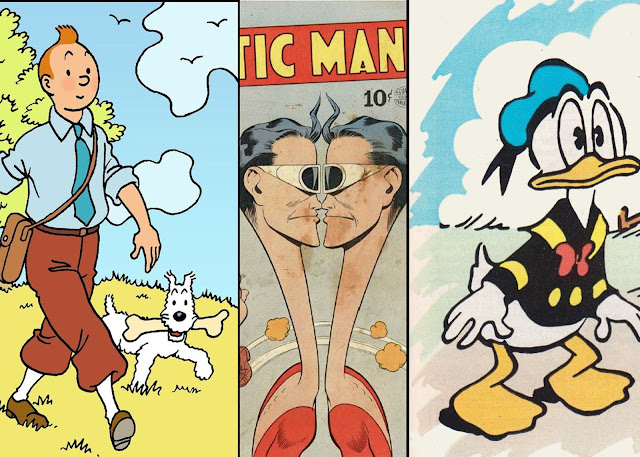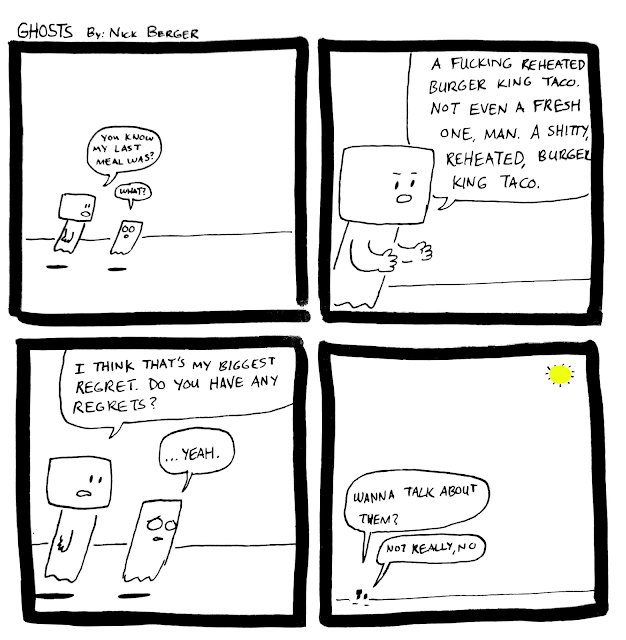Week 4-The Comic Book
This week, I read Donald Duck: The Golden Helmet and Donald Duck: The Lost Peg Leg Mine by Carl Barks, The Adventure of Tintin: Destination Moon by Hergé, and Jack Cole and Plastic Man by Art Spiegelman and Chip Kidd. I also attempted to read Detective Comics #357, but I had gotten it from a dollar bin and the cover fell off the instant I opened it, and it didn't get better from there.
Anyways, reading these older comics is interesting, considering I've mainly read more modern comics (mostly late 1990s- early 2000s stuff from my dad's collection when I was a kid, and of course books from the 2010s now). Of course I've read some classics from the 1970s and 1980s, but I don't remember reading anything earlier than Stan Lee and Steve Ditko's run on Spider-Man. All this to say, it was a bit of a shock seeing how compressed the storytelling was in these Golden Age/early Silver Age books. By compressed, I mean that every story is told quickly and efficiently. There aren't many moments of breathing room, and there are frequent time skips indicated by text boxes saying something like "two days later."
This isn't necessarily a bad thing, as it results in quick and fun reads, but like I said earlier, there isn't much breathing room, sometimes making these exhausting to read all at once. Of course, these weren't meant to be read all at once; more so in this early era of comics than in later eras, each issue would tell a complete story, with a beginning, middle, and end. In other words, there was less room to tell a story, so cartoonists had to get straight to the point. This meant developments like The Golden Helmet corrupting its wearer would appear very suddenly towards the end of the book, the only time it was relevant. This also led to frequent "exposition dumps," such as in the end of Police Comics #22, where Bright Eyes explains his whole tragic backstory to Plastic Man and Woozy Winks.
While this compressed storytelling can lead to some moments of messy exposition or quick fatigue, there is always a sense of getting your money's worth that is lost in current comics. The industry right now encourages writers to write for collections, rather than to tell a complete story in a single issue (at least when it comes to mainstream publishers like Marvel and DC). 10 cents got you a lot more story back then than $3.99 gets you today. Whether you think that's a good or bad thing is up to you.
Anyways, reading these older comics is interesting, considering I've mainly read more modern comics (mostly late 1990s- early 2000s stuff from my dad's collection when I was a kid, and of course books from the 2010s now). Of course I've read some classics from the 1970s and 1980s, but I don't remember reading anything earlier than Stan Lee and Steve Ditko's run on Spider-Man. All this to say, it was a bit of a shock seeing how compressed the storytelling was in these Golden Age/early Silver Age books. By compressed, I mean that every story is told quickly and efficiently. There aren't many moments of breathing room, and there are frequent time skips indicated by text boxes saying something like "two days later."
This isn't necessarily a bad thing, as it results in quick and fun reads, but like I said earlier, there isn't much breathing room, sometimes making these exhausting to read all at once. Of course, these weren't meant to be read all at once; more so in this early era of comics than in later eras, each issue would tell a complete story, with a beginning, middle, and end. In other words, there was less room to tell a story, so cartoonists had to get straight to the point. This meant developments like The Golden Helmet corrupting its wearer would appear very suddenly towards the end of the book, the only time it was relevant. This also led to frequent "exposition dumps," such as in the end of Police Comics #22, where Bright Eyes explains his whole tragic backstory to Plastic Man and Woozy Winks.
While this compressed storytelling can lead to some moments of messy exposition or quick fatigue, there is always a sense of getting your money's worth that is lost in current comics. The industry right now encourages writers to write for collections, rather than to tell a complete story in a single issue (at least when it comes to mainstream publishers like Marvel and DC). 10 cents got you a lot more story back then than $3.99 gets you today. Whether you think that's a good or bad thing is up to you.




Comments
Post a Comment